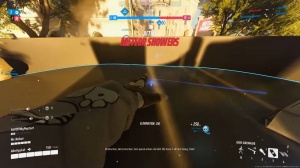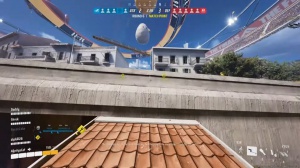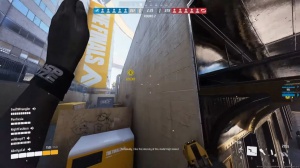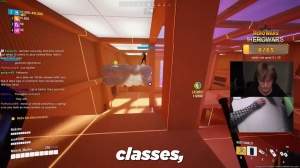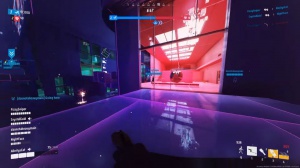Why The Finals Isn't Competing With Top Fps Games Yet
Intro

Hey, I'm Olly, a designer and developer from the UK, and compared to most gamers, I spend a lot more time thinking about things like interfaces, behavioral mechanics, and games. Super exciting stuff, I know. This is a article about the progression system in the finals. Context is important here, so I'm going to ramble a little before I share the designs I've been working on.
You can skip to the visuals using the time stamps below, but I'd recommend watching the whole article so we can talk about in more detail.
Community feedback
The finals are still a new game with a lot of room to grow. This is a good thing because it means Embark is still learning about what their players enjoy, and we have the opportunity as players to celebrate them when they hit the mark or provide feedback when they don't.
Ultimately, we all want the game to succeed, and I believe they've done a great job so far. I say this because, as individuals, our opinions aren't very helpful, but as a community, our collective sentiment is highly valuable. By sharing our ideas and hopes for the game in a friendly way that welcomes more opinions to join in, we help Embark build a better game that we continue to enjoy.
Fps comparison

the competitive FPS market is huge, but six months in and I'm still not entirely sure which games the finals are competing with. This makes it hard to compare the finals against other games; what should it be doing more or less of, what does it do well, and what could it improve on what other games are doing that players enjoy?
Having a basis for comparison is a good way for us to start a discussion and for new players to understand what they're missing out on. Personally, I find myself having more fun in the finals than with other mainstream titles like Call of Duty or even competitive PC titles like CSG and Valorant. If you're watching this article, the chances are you agree.
Player-base stats
However, the numbers show that there is a lot of ground to cover before the finals are truly competing with other FPS titles. If we want a healthy player base, short Q times, ongoing P new features, and so on, the size and relevance of the player base are important details to consider, and none of this changes overnight, unless, of course, you're Apex Legends and launch a polished game out of.
Challenges

All this thinking has led me to explore the reasons why new FPS games often struggle to compete with the entrenched mainstream.
Titles, age of the game, many successful games have built their play base over many years, the finals is still a new game, and there are still a lot of people who haven't even tried it yet. The stability of the meta-successful games has stabilized and now updates incrementally in small. Updates and new games, like the finals, fluctuate a lot early on as players learn how to abuse the mechanics and developers experiment with balancing.
This is still where we are now with the game: positive feedback loops, or, in other words, dopamine machines. Successful games have many ways to experience success and excitement beyond the core gameplay.
Dopamine from games
Loop new games like the finals focus on the core gameplay first, which finally leads me to the subject of this article.

It's logical to think that most competitive titles have built a built-in feedback loop: you get kills, you win games, rinse and repeat; however, modern multiplayer games have raised the bar to provide more types of rewards at a much higher frequency, unlocking guns, leveling up infinitely in some cases, unlocking camos, and much more that I'm sure you've experienced.
The finals have already improved significantly on this in season 2 with features like the career circuit; however. I believe this is going to be one of the primary factors in maintaining a larger player base in the future. Now I'm reading off a script here, but I wanted to add something again that I forgot to include because the finals do have some things like unlocking things throughout the progression system, but that has a fairly quick end point, so for players who enjoy this game and have put in more than like 15 to 20 hours, a lot of those run out and expire, and what I'm referring to here is progression systems that are fairly renewable, things like things that repeat each season or things that have an infinitely scaling system, which is much harder to implement, and so I just wanted to clarify that they're the kinds of things I'm referring to here.
So, as I was saying, a larger play base is a good thing if we want the game to succeed and grow. Positive feedback loops come in many forms; in this article. I'm going to focus specifically on progression systems, and I just want to make a quick thanks to Fixie for his article, which gave some shape to my ideas at the perfect time, meaning that I was thinking a lot about these concepts and then his article gave some shape to how they could manifest themselves in the game. So I'll link a article to where he spoke about the expectations that he had for the World Building and in-game sponsors.
The concept

I took these ideas and ran with them to create mock-ups for a progression system that I believe would leverage the in-game universe to provide new opportunities. for positive feedback and features that maintain a player's interest levels.
Welcome to a future hypothetical season of the finals where I'm in charge. You've been playing well, and sponsors have noticed you; they want to get in on the ground floor and work with you as you build your career in the arena. This season, Halto and Oso are exclusive partners in the finals. They want to work with you for additional brand exposure.

Each will provide weekly contracts for seasonal branded awards. Who are you going to sign with? With six contestants on your roster, each of them can sign with a different sponsor for the season. Each of them can contribute towards your sponsorship contracts and earn their respective sponsor. Rewards and seasonal sponsorships are like many battle passes; they operate much like the current career circuit with weekly contracts.
The difference here is the storytelling, the inclusion of sponsors, and the multiple progression features. Each contestant represents one sponsor at a time in the game and on seasonal leaderboards. Sponsors maintain these seasonal leaderboards to show off their signed contestants. You can browse sponsors from previous seasons and explore their leaderboards and events.
If you didn't play in the past season, you could purchase the sponsorship contract to earn the rewards. Sponsorships aren't just for show, though clearly that's an important part of it. Seasonal sponsors clash in weekly events for advertising rights for banners in games. This week, Halto came out on top; they're now featured on dynamic banners in each arena until next week's event.











